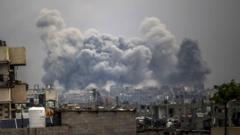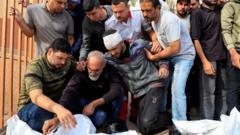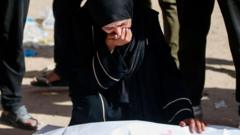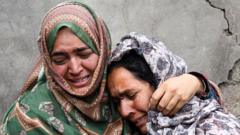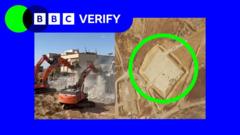Amid an enduring humanitarian crisis, families in Gaza struggle with extreme hunger as military actions and a total blockade result in shortages of food and essential supplies. Children are going to bed hungry, with mothers sharing heart-wrenching accounts of their daily battles to provide even one meal for their families.
"Desperate Hunger: Gazans Face Crisis Amid Ongoing Blockade"
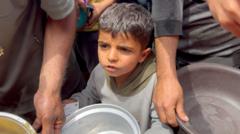
"Desperate Hunger: Gazans Face Crisis Amid Ongoing Blockade"
Reports from Gaza reveal the harrowing struggle of families facing severe food shortages and the impact of Israel's military actions and blockade.
As children line up at food distribution points in northern Gaza, the stark realities of the blockade become painfully clear. Six-year-old Ismail Abu Odeh, excited yet desperate, cries out for food, only to have his bowl of lentils knocked from his small hands on his way back to his family’s tent. With no food deliveries at the displacement camp where he resides, he returns to his tent in tears, further highlighting the dire situation faced by many families in the region.
The BBC has been speaking to Gazans during intensified Israeli military actions, as the region endures over 10 weeks of blockade from food and medical supplies. The UN warns that Gaza is teetering on the brink of famine. While the Israeli government claims there is no food shortage, it has employed the halting of aid as a strategic measure against Hamas, which exacerbates the plight of civilians.
Stories from local residents depict a desperate struggle against hunger, with some managing to secure just one meal per day. A food kitchen volunteer discussed operations that are now running on a day-by-day basis, and some kitchens have shut down entirely due to crippling shortages. Residents report the rising costs of remaining food items, which are now inflated beyond their reach.
One woman in northern Gaza mentions feeling constantly dizzy and fatigued, a reflection of the ongoing food deprivation affecting both her and her children. Another man, displaced from al-Zahra, explains innovative but inadequate methods of meal preparation to cope with the scarcity.
Healthcare workers also suffer as medical supplies dwindle due to the blockade, with several describing the fear induced by Israeli strikes targeting hospitals. A nurse recalls a terrifying moment when the hospital she worked at received a direct hit. Despite the chaos, medical staff remain committed to their patients as they navigate dwindling resources.
Compounding these hardships, families like Ismail's contend with the emotional toll of their situation. His father, overwhelmed by the inability to feed his children, openly shares his heartache. His despair reflects a wider sentiment among parents struggling to care for their families in a climate marked by violence and hunger.
As countries discuss new ways to deliver humanitarian aid, concerns mount over the implications of “weaponizing” assistance, leaving Gazans wondering if relief will come soon enough in light of their daily battles against hunger and despair.

